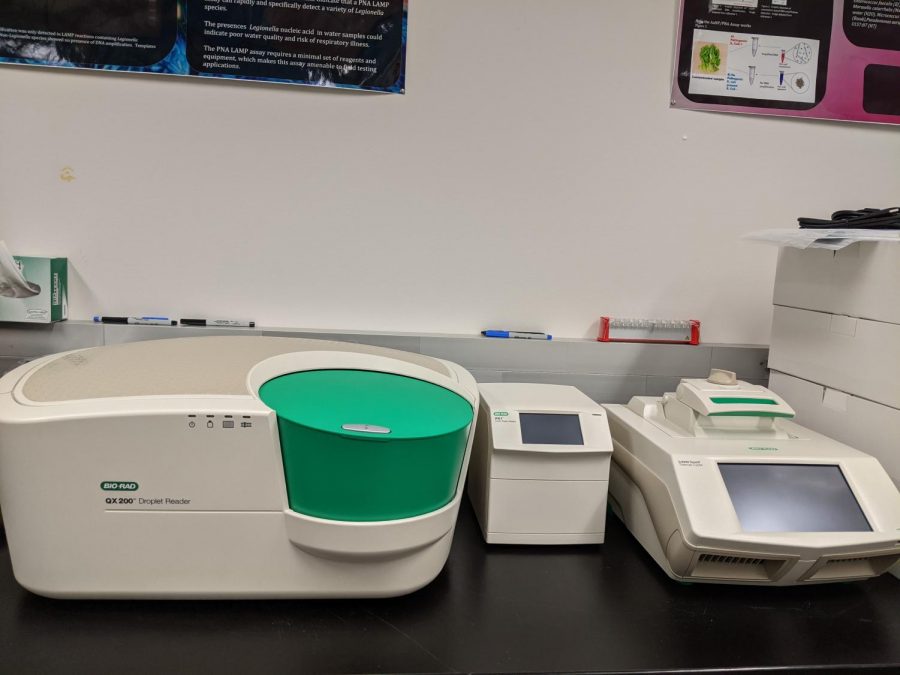NMU lab continues to surveillance COVID-19 in local wastewaters
Many labs in Michigan will begin testing their local wastewaters for COVID-19 as part of the new pilot program. The program could serve as a warning system in these communities.
SURVEILLANCE TESTING—As part of the three month pilo program, NMU lab will work with ddPCR machines to analyze wastewater from various different lift stations around Marquette to locate COVID-19 and its variants.
September 3, 2021
Surveillance of COVID-19 and its variants in local and on campus wastewater have continued with the use of ddPCR machines since last October after Josh Sharp, associate professor of biology, and his team joined a network of labs across the state who were given a $10 million grant.
The Michigan Department of Environment, Great Lakes, and Energy and the Michigan Department of Health and Human Services last September launched a three month pilot program that allowed many labs across the state to begin testing their local wastewaters for COVID-19. These labs, including NMU’s, use ddPCR machines to analyze wastewater from several different lift stations around the area to locate COVID-19 and its variants.
The process to isolate the COVID-19 in the wastewater goes as follows.
— A couple of chemicals are added to the water. One of those chemicals attracts the lipids in the virus’s outer envelope. This mixture is centrifuged so they are able to extract the nucleic acids.
— The nucleic acids are put through an RNA isolation kit which purifies the RNA from all of the wastewater. There will be other crude bacterial and organism RNA that is present in the water.
— This material is put into ddPCR machines which amplifies a specific piece of RNA, in this case, RNA that belongs to COVID and any of its variants. This allows those in the lab to quantitate how much COVID is being shed off from people in the community, regardless of their symptoms or lack thereof.
— These results are then delivered to local health departments and they decide how and when to take action.
This analysis process takes two days to do and a third to send the reports out to the correct health departments. NMU’s lab currently receives daily samples from the Baraga Avenue, Hawley Street, Lake Street and Pine Street lift stations along with samples from the wastewater treatment plant.
“Pine Street lift station is one of the more important ones that we are interested in. Because a lot of the waste from our campus flows towards that lift station,” Sharp said. “So that is one that we’re really interested in because that can give us an idea of what’s happening around campus.”
As of right now, the lab has only seen standard COVID-19. As the population grows with students coming back to campus for class, there has been an increase in the Delta-variant which is what labs across the US are witnessing as well. The lab recently received new probes to help detect the UK, South African and Brazil variants as well.
“This summer, when COVID levels have been very low in the community, that was reflected in what we were seeing in the lab as well, there is very little COVID in the wastewater,” Sharp said. “Now, as fall is approaching, we have started to see levels slightly starting to increase. So it’s kind of neat, watching those trends actually develop in close to almost real-time.”
However, the lab has not witnessed any sharp increase in the virus thus far. Despite this, with the increase in the more infectious Delta-variant, there’s an urge to remain vigilant.
“I think we haven’t had these huge, huge outbreaks in the market. They’re just sort of these steady increases in the community,” Sharp said. “But we will see. I mean, COVID can dramatically change, especially with the delta variant now, that can spread more rapidly in a population.”
Sharp’s lab team consists of a lab technician and a few students, all of which were trained on Zoom before in-person work on the machines. With the straightforward use and protocols for the machines and any preparation required, new lab employees can be trained within a week.
“The most important part of this project is that it helps keep people informed so that they can make the best decisions for their health,” Bailey Gomes, junior and Forensic Biochemistry and Pre-Med major, said. “I think viral monitoring has the potential to become very big, especially given the circumstances with COVID.”
Sharp and his team will continue to monitor COVID-19 and several variants until the end of this year. Currently, another year of funding is going through the end of the budget approval process at the state level.



























